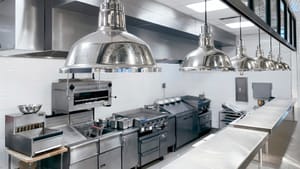Ghost kitchens, also known as cloud kitchens, dark kitchens, or virtual kitchens, fulfill online orders like a typical restaurant but have no storefront or dine-in option. Ghost kitchens intend to take advantage of high delivery demand while lowering costs by having no front of house. Brands can operate multiple concepts out of the same kitchen, appearing to be multiple, real, physical restaurants to consumers.
Throughout the pandemic, over 70,000 restaurants in the United States were forced to close, leaving a tremendous number of vacant spaces. While ghost kitchens were created long before the pandemic, they truly took off under COVID-19 circumstances. In 2020, Uber founder Travis Kalanick founded CloudKitchens, purchasing more than 40 locations in 24 cities for $130M. In 2021, Wendy’s planned to open 700 ghost kitchens with Reef Technology. Large chains, such as Applebees, saw an opportunity to keep existing dine in concepts while operating additional, sometimes entirely unassociated, delivery brands out of the same kitchen.
Earlier this week, Kitchen United, a leading cloud kitchen that raised $175 million in funding and was backed by Kroger, announced it would sell or close all of its locations. Kitchen United ran its delivery only restaurants through Kroger stores, malls, and other chain restaurants through a shared kitchen space. (CNN)
In a short amount of time, consumer behavior returned to pre pandemic activity. Unfortunately for these new concepts, consumers quickly wanted dine in again. The NRA (National Restaurant Association) found that 70% of diners believe it is important for their food to come from a publicly accessible, physical location. (CNN)
People struggled with being unable to see where or how there food was prepared. In some cases, people felt like they were being duped, thinking they were ordering from a small, local restaurant when in fact they were ordering from a major chain selling multiple cuisines out of one kitchen. According to Stephen Zagor, a restaurant consultant and hospitality professor, returning to restaurants meant the “mystery meal world of virtual restaurants wasn’t as necessary.” “We care a lot about what my restaurant is about, and how fresh and delicious the food is.” (CNN) While people will continue to order from delivery apps, consumers want restaurants they have been to, seen, or heard of. They do not want shell restaurants created out of technology and marketing.
However, CNN categorizing the ghost kitchen industry as “crashing” and “flaming out” unfairly characterizes the state of the industry. Wonder Group, a food-delivery startup founded by Marc Lore, received a $100M investment from Nestle earlier this month, including over $850M for the business to date. Lore categorizes Wonder as a “delivery first food hall” serving high-end food. Wonder partners with famous chefs and restaurants, creating made-to-order food delivered by a Wonder employed courier. One unique wrinkle is despite their delivery dominant business, some Wonder kitchens operate out of food halls that guests can actually walk into. In addition, consumers can order four different dishes from four different “restaurants” in a single order, and have it delivered together. In summary, Wonder is attempting to use the ghost kitchen model while eliminating the negative post-pandemic stigmas. (Restaurant Business Online)
Regardless of your opinion on the ghost kitchen, the typical third-party food delivery model is unsustainable for most restaurants, and the industry is still seeking a longstanding solution. Despite restaurants losing money on third-party delivery, delivery sales will continue to increase exponentially over the coming decades. While ghost kitchens provided many restaurants a lifeline during the pandemic, consumers showed that over time they prefer a tangible food option. And despite the recent ghost kitchen closures, there is a reason major corporations like Nestle strongly believe in some hybrid form of the ghost kitchen model. The industry is getting closer to a sustainable delivery model, and delivery dominant kitchen will likely play a key role.


